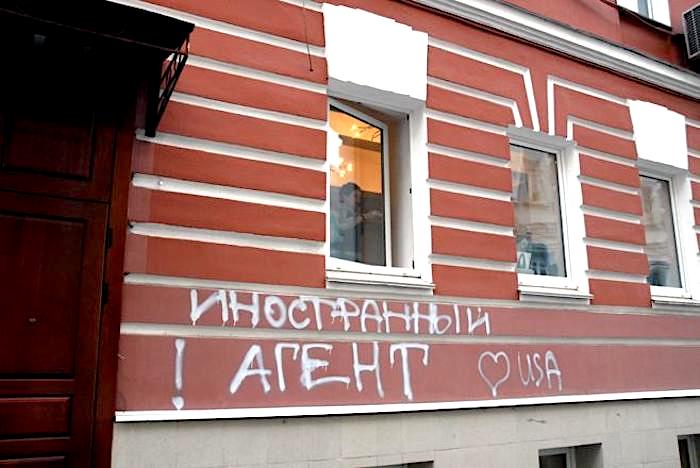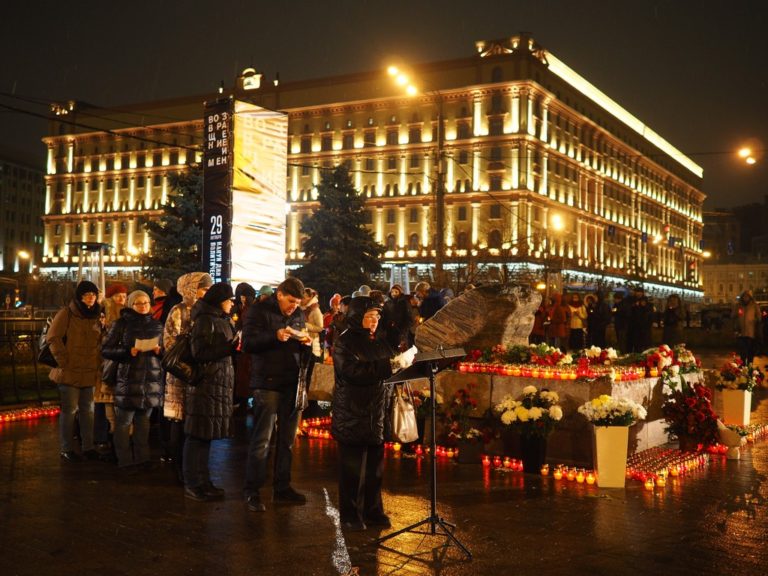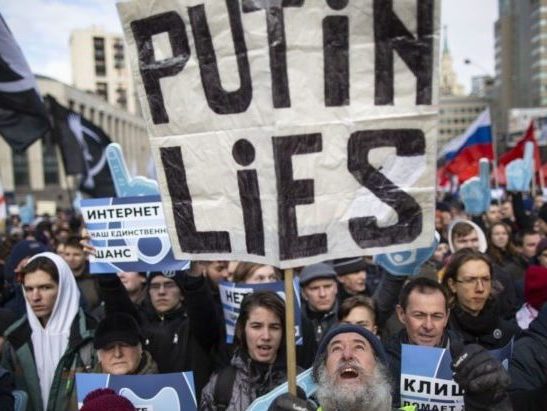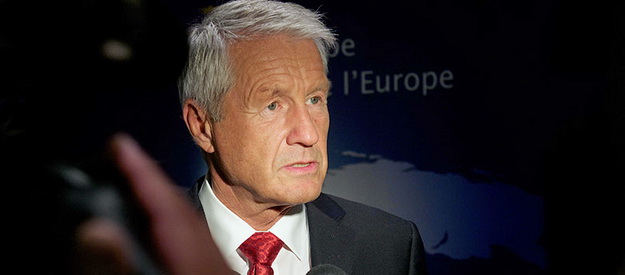Russia has moved one step closer to shut down Memorial, Russia’s most famous human rights organization, accusing it of violating its “foreign agent law” and of “justifying the activities of participants in international extremist and terrorist organizations.” This is hardly the first state assault on the revered organization most widely known for its work on exposing the Soviet terror policies Russian authorities would prefer to be hushed up and standing up against modern-day repressions. Euromaidan Press dug into what Memorial is, what it does, and how it drew the ire of Putin’s regime.
On 11 November, Russia’s Prosecutor General filed a lawsuit with the Supreme Court to liquidate Russia’s top human rights organization, the International Memorial Society; a similar lawsuit was launched regarding its daughter Memorial human rights center with the Moscow city court on 8 November.
Russia accuses Memorial of violating its “foreign agent law” and of “justifying the activities of participants in international extremist and terrorist organizations.” Memorial strongly rejects both accusations, stating that “this is a political decision to destroy the Memorial Society, an organization dedicated to the history of political repression and the protection of human rights.”
This is not the first time Russia tries to snuff out Memorial. As before, a movement in support of the organization has sprung up.
What is Memorial and why has Russia moved to ban it? Euromaidan Press explains.
Accused of justifying terrorism for maintaining a list of political prisoners
Years ago, Russia designated both the Memorial Society and the Human Rights Center as “foreign agents” under a law obliging foreign-funded NGOs to undergo additional audits and add a disclaimer about their said “agent” status in all information materials.
The lawsuit of the Moscow prosecutors against the Memorial Human Rights Center accuses the organization of publishing materials in its social media without the “foreign agent” disclaimer, BBC reported. The lawsuit lists eight such occasions in 2019, with the ensuing fine of RUB 1.6 mn ($21,800).
“The organization demonstrates a persistent disregard for the law, does not ensure the publicity of its activities, prevents proper public control over it, which grossly violates the rights of citizens, including reliable information about its activities,” the Moscow prosecutor’s office says in its claim.
Another accusation stems from a linguistic analysis of Memorial’s materials on Jehova’s Witnesses (designated as an extremist organization in Russia and banned), the Russian left-wing political movement Artpodgotovka (designated as an extremist and terrorist organization), and the Muslim Hizb ut-Tahrir movement (also designated as a terrorist organization).
After Russia’s 2014 occupation of Crimea, many in that list are Ukrainian citizens: the Russian occupation authorities expanded their pan-Russian war on Muslims to the Crimean Tatars, the ethnic Muslim indigenous minority of the population who opposed the illegal landgrab. They are routinely imprisoned to tens of years in prison on charges of Hizb ut-Tahrir membership.
These charges are often fabricated, as revealed by independent experts who exposed the pocket linguistic analysts rubberstamping prosecutorial accusations. The cases contain multiple irregularities, such as anonymous witnesses, “prohibited books” planted during searches by security agencies, and torture to extract coerced confessions.
(No) right to a fair trial, or a manual to Russia’s conveyor of repressions in Crimea
According to the Russian Memorial Human Rights Center, the 2003 Supreme Court of Russia decision declaring Hizb ut-Tahrir a terrorist organization had no credible justification, as there was no proof of its members ever committing terrorism. Being intolerant to dissenting religious views, Russia has continuously used Hizb ut-Tahrir allegations as a tool to persecute innocent people professing Islam.
Linguistic experts who Russian prosecutors asked to study the center’s materials on these organizations stated that they contain “justifications for the activities of participants in international extremist and terrorist organizations” and that they “form opinions on the admissibility of participation” in extremist and terrorist activities.
Notably, Memorial’s political prisoner list was also deemed as “justifying terrorism,” despite the center clearly stating that “the recognition of a person as a political prisoner does not mean either that the Memorial Human Rights Center agrees with his views and statements, or approves of his statements or actions” on their website.
Thus, the prosecutor’s office insists that the human rights center has grossly and repeatedly violated the Russian Constitution and its federal laws. The prosecutor’s office asks the court to liquidate the human rights center Memorial and all of its structural divisions. The lawsuit against the “International Memorial” contains similar accusations.
Notably, Memorial, among other Russian NGOs affected by the “foreign agent” legislation has lodged a lawsuit against Russian prosecutors in the European Court of Human Rights.
“We have repeatedly stated that the law was originally conceived as a tool to crack down on independent organizations, and insisted that it should be abolished. However, as long as the law exists, we are forced to comply with its requirements,” Memorial said in its statement.
“20-year prison term for jaywalking”

In her interview with BBC, Memorial’s senior lawyer Tatyana Glushkova compares the punishment proposed by Russian prosecutors — liquidation of the organization — for omitted “foreign agent” disclaimers in several internet publications and books to a 20-year prison term for jaywalking. She says that after paying the fines, Memorial marked their materials as required by Russian legislation and that the stated offenses can in no way be called a gross violation of Russia’s laws.
Russia’s Supreme Court defines “gross violations” as “actions aimed at denying fundamental democratic principles, rights or freedoms,” as well as “promoting war or inciting national, racial or religious hatred, calls for discrimination, hostility or violence.” For 30 years, Memorial has been fighting against such violations, the lawyer notes.
What the International Memorial Society is known for

Memorial was founded in 1987 by a group of dissidents who wanted to preserve the memory of the victims of Soviet political repressions. Its first chairman was Nobel laureate Andrei Sakharov, a Soviet nuclear physicist and activist for disarmament and human rights.
In 1990, Memorial members retrieved a stone from an expedition to Solovki, where hundreds of political prisoners were incarcerated and killed in a concentration camp during the days of Stalin’s repressions, including the Ukrainian Intelligentsia. This stone became a monument to victims of political repressions on Lubyanskaya Ploshchad in Moscow, where the names of the victims of Soviet repressions are regularly read aloud since 2007 in popular mass actions called “Returning the names.”

The organization also published books about the history of repressions in the USSR, maintains an archive of those repressed during Soviet times and the employees of the KGB/NKVD secret police that repressed them. Memorial attempts to declassify the historical archives of those times, but Russia’s security organs are reluctant to divulge which of their employees took part in the Soviet repressions.
Prisoners of state secrecy: How Russia aborted its “archival revolution”
Particularly, Memorial is embroiled in court proceedings with the Russian Prosecutor General’s Office, demanding to reveal the names of prosecutors who were part of the NKVD troikas, meaning they issued death sentences to hundreds of Soviet citizens without a public trial in the times of Stalin’s Great Purge. Prosecutors categorically refuse to make those names public.
In 2008, Memorial’s St. Petersburg office was raided by the authorities, and its digital archives containing research of atrocities committed under Stalin were confiscated. Office director Irina Flinge believed that Memorial was targeted because their organization is on the wrong side of Putinism, specifically the idea “that Stalin and the Soviet regime were successful in creating a great country,” Eventually, the disks were returned to Memorial.
A more recent example took place in October 2021, when around 20 men broke into the Moscow office of Memorial and disrupted a public film screening of Mr. Jones, a film about the Holodomor, an artificial famine of Ukrainians conducted by Stalin in 1933-34. Upon arriving, police did little to help the center and instead blocked the door and attempted to search the premises without the presence of lawyers.
As well, Memorial is engaged in physically excavating the bodies of those killed during Soviet repressions. Memorial members are trying to build a National Memorial Museum complex in Kovalevsky Forest to commemorate the alleged 4,500 victims of the Red Terror, whose bodies they discovered in 2002.
An expedition led by the leader of Karelia’s Memorial branch Yuri Dmitriev found 236 common graves containing the bodies of over 7,000 victims of Stalin who were executed in 1937-38 on the Sandarmokh killing field. In 2016, Russian authorities attempted to revise the account of the Soviet massacre, claiming that among the dead were Soviet POWs shot by invading Finns in 1941-1944, a claim challenged by Memorial.
Gandalf’s case: Russia prosecutes man literally digging up its darkest Gulag secrets
“Initially, Memorial arose around the problem of restoring historical truth about the massive political repressions in the Soviet Union. However, it soon became apparent that it was impossible to talk about the repression in the past without touching on the problems of ongoing human rights violations today. Since the most important mission of Memorial is to influence public consciousness, history and current human rights protection must go together in [Russia]. Thus, Memorial became both a historical-educational and human rights organization,” Memorial Board member Oleg Orlov explains on its website.
Right now, 74 organizations are part of the International Memorial Society, each with its own area of expertise, from preserving the memory of victims of political repression to modern human rights protection. One such organization, albeit a very major one, is the Memorial human rights center.
What the Memorial human rights center does
Apart from digging into the Soviet past, Memorial started defending human rights in modern Russia. Memorial’s Head of the Board Yan Rachynskyi believes that the methods of the past have not disappeared: in modern human rights violations, Russian prosecutors cover up criminals in uniform, and rights as such are increasingly limited without any control, which is also a legacy of the past.
“It is thanks to Memorial that we know how human rights were violated both during the Soviet history of the 20th century and in modern Russia, primarily in the North Caucasus, where Memorial Human Rights Center investigated human rights violations, saved lives, and helped many of our fellow citizens to restore justice,” Kirill Koroteev, head of international practice of the International Agora human rights group and former legal director of Memorial Human Rights Center, told BBC.
As part of its human rights work, Memorial is engaged, in particular, in researching violations of human rights and the norms of international humanitarian law in areas of mass conflict, providing legal assistance to refugees and internally displaced persons. It creates reports on human rights violations in Central Asia and Russian Caucasus republics.
Memorial had an office in Chechnya, the rebellious Caucasian republic where, following two wars, strongman Ramzan Kadyrov was installed as president in 2007, to monitor human rights issues there. Journalist and Memorial activist Natalia Estemirova investigated murders and abductions by the pro-government militias in the war-torn republic; she was abducted and shot to death in July 2009. Memorial’s chairman Oleg Orlov personally accused Ramzan Kadyrov of being behind the murder; Kadyrov sued Memorial and partially won.
However, the European Court of Human Rights ruled Russia had not conducted an effective investigation in Estemirova’s case, but found the state’s guilt in the crime unproven. Russia must pay the sister of the murdered EUR 20,000.
The European Court of Human Rights also ruled Russia pay a EUR 82,000 compensation to Memorial Head Oleg Orlov and three Russian journalists who arrived to cover protests against Russian law enforcement in the Caucasus republic of Ingushetia, finding that the authorities are guilty of failing to investigate the crime, unlawfully imprisoning the defendants, and violating the right to the protection of property.
In 2018, the head of Memorial’s Chechnya department Oyub Titiev was put on trial on the accusation of storing drugs. Titiev claimed that the drugs were planted by law enforcement.
The human rights center maintains a list of political prisoners in Russia (currently, there are 420 such persons — five times more than five years ago). It pays special attention to the fabrication of cases of Islamic extremism in Russia; 340 out of the 420 prisoners on the list are persecuted for their religion; most of them are Muslims.
Memorial activists and lawyers monitor and defend the rights of imprisoned citizens, including activists imprisoned in mass arbitrary detentions following protests. As well, in a coalition of other human rights organizations, Memorial prepared suggestions for reforming Russia’s interior ministry and fighting police impunity.
Memorial’s lawyers also represent the interests of Russian citizens at the European Court of Human Rights. Some of the more resonant lawsuits include the Chechnya murder of journalist and Memorial activist Natalia Estemirova in 2009, the case of the deaths of people during the 2004 Beslan school siege, and challenging the law on foreign agents.
Russia’s previous attempts to shut down Memorial
The recent lawsuits against the human rights NGO aren’t the first time Russia has tried to shut down Memorial. In 2014, the Russian Ministry of Justice filed a lawsuit with the Supreme Court to liquidate the organization; it concerned a member of the International Memorial Society, the All-Russian Society “Memorial” headed by human rights activist and Soviet dissident Sergei Kovalev. The Ministry of Justice, just as Russian prosecutors today, alleged that the organization had “repeatedly and grossly” violated Russia’s Constitution and laws by uniting various organizations but not having an all-Russian status in its statute.
A public outcry followed, Memorial was given time to change its statute, and the Supreme Court refused to liquidate it.
This was followed by a scandal in 2015, when Russia’s Ministry of Justice directly accused Memorial of violating the constitutional order in a regular check of the activities of the organization in its status of a “foreign agent.” Memorial was accused of “undermining the foundations of the constitutional system of the Russian Federation, calling for the overthrow of the current government and a change in the political regime in the country” by publishing articles criticizing Russia’s actions against Ukraine and the sentences against participants of the 2012 “March of Millions” on Bolotnaya Square in Moscow.
Then, roughly 100 public figures spoke out in defense of Memorial, and no consequences followed.
Why does Russia want to shut down Memorial?
A movement in support of Memorial is unfolding now, too. A petition in support of the organization has been signed by more than 61,000 people, and public intellectuals are speaking out once again. And they say the ideology of Putinism is to blame, which aims to exploit a myth of the lost glory of the USSR while brushing aside its crimes against humanity. This state policy has reaped fruit: some 70% of Russians approve of the policies of Soviet dictator Joseph Stalin, and 39% name him as the most “outstanding figure of all time.”
It is no surprise that Memorial’s exposure of Soviet crimes hits a sour note with the Russian elites.
“In 2016, Memorial published a large book listing the NKVD officers who were directly related to the ‘repressive apparatus,'” Russian professor Andrey Zubov told Voice of America: “I believe it contains some 50,000 names of executioners. And this aroused the fierce hatred of the authorities since many high-ranking people in Putin’s entourage recognized their grandfathers and fathers in the list. This explains such an irrepressible desire to ban Memorial, and in fact — to ban memory.”
In turn, deputy executive director of the Boris Yeltsin Presidential Fund, historian Nikita Sokolov is convinced that
“the [Russian] authorities today are adopting a specially prepared version of history as an ideology.” This is the history of an “infinitely beneficial state,” in the past of which everything is glorious and wonderful,” he says. “And Memorial advocates a fundamentally different version of history — the history of human destinies, which dissonates with the concept of power,” Sokolov told Voice of America. “Naturally, therefore, a clinch of these two images of Russian history was unavoidable. Thus, the attack on Memorial was to be expected.”
Meanwhile, lawyer Daniil Petrov told the BBC that
“People who have studied the past of their family and gotten a taste of the Soviet archives, especially documents of the Soviet power structures and the Communist Partz, are likely to continue to be resistant to the myths of the ‘lost Soviet paradise.’ Thus, the work of Memorial was somewhat of an inoculation against viral propaganda from the outside. And this is a big setback for the current authorities, who obviously try to manipulate the public historical consciousness, stirring up nostalgia for the Soviet Union and doing it both through legal and propaganda means.”
Will Russia’s latest attempt to shut down Memorial succeed?
Rachinsky promises that regardless of the outcome of the trial, Memorial will not stop working either in Russia or abroad. He recalls that at the dawn of Memorial’s existence, the organization did not have a legal entity, and this did not prevent it from working on a large scale.
Related:
- Crimean Tatars in the crosshairs of Russia’s war on Muslims
- (No) right to a fair trial, or a manual to Russia’s conveyor of repressions in Crimea
- Why Ukraine should support Yuri Dmitriev, Russian historian unearthing Stalin’s repressions
- President of Memorial: Russian rights activists who backed Russia’s return to PACE repeated error of liberals in 1993
- “You can’t bow down to the offender” – Memorial’s Gannushkina on PACE’s push to lift Russian sanctions
- Gandalf’s case: Russia prosecutes man literally digging up its darkest Gulag secrets
- Jailed Russian historian exposing Soviet crimes awarded Sakharov prize
- Prisoners of state secrecy: How Russia aborted its “archival revolution”






